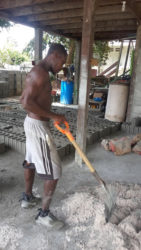Late in 2014, 34-year-old Kwame La Fleur quit his job as a driver/salesman with Ansa McAl. He had decided to take the plunge into the business of his own. In a general sense he had become attracted to the idea of being ‘his own man,’ so to speak, though, at the time, he did not have the faintest idea as to exactly what sector he would choose. “I just wanted to be independent,” he said.

As a student at Kingston Community High School, La Fleur had done some masonry classes. It was as close as he came to possessing a skill of his own.
Thus was born Heavenly Home Building Blocks. Perhaps unsurprisingly, the initial support came from his parents and grandparents. Heavenly Homes’ first business location was at La Fleur’s grandmother’s Sophia residence. The state of the Sophia roads, however, seriously inhibited customer access. Accordingly, he readily embraced the option of production space at his father’s 209 Meadow Brook Gardens residence.
Newness in a highly competitive trade coupled with the squeeze on spending attributed to the imminent 2015 elections meant the business was ‘slow’ during the first six months of operations. The absence of liquidity inevitably led to a search for financing to keep the enterprise going. On the recommendation of his stepmother he approached the Institute of Private Enterprise Development (IPED). Using his motor vehicle as collateral he secured a loan of $400,000. The loan allowed for the purchase of wheelbarrows, assorted steel moulds for moulding the blocks and a consignment of sand and cement. With the responsibility for repayment of a loan hanging over his head, La Fleur was now about to take a real plunge into business.
Heavenly Homes has particular reason to remember a contractor named Nigel. He was La Fleur’s first customer, purchasing 1,000 blocks. While he welcomed the monetary reward for his labour, La Fleur said he was equally elated over the knowledge that a customer had placed a considerable level of confidence in the product. It was a significant confidence builder.

The elation of his first sale has long evaporated into a sober realization that business can be a long, arduous journey. The block-making industry is not only a highly competitive one in the environment of a building boom. Sales are unpredictable. Sales volumes can be determined by the number of blocks standing like soulless monuments, waiting to be sold. Stockpiling is part of the trade but there are bills to be paid.
Still, La Fleur said, there are advantages to be derived from stockpiling blocks. He recalled that earlier this year he had spent almost 24 hours delivering blocks that had been stockpiled and that the next day both he and his workers took the day off.
Heavenly Homes offers three-inch blocks for $90 each, four-inch blocks for $95 each and six-inch ones at $140. Purchasers of a minimum of 200 blocks benefit from free delivery around Georgetown. That is an example of the kind of marketing ‘gimmick’ that helps to keep you ‘in the game.’ The current building boom may have rendered block-making a worthwhile business but the competition remains fierce, nonetheless, pressing businesses into finding ways to remain competitive.
La Fleur believes that there are moments in business that you have to be prepared for.
He believes that his own transition from driver/salesman to business owner was probably less challenging than he might have expected though he credits much of that to family support. Still, he remains far from where he wants to be, ‘hanging in’ at a break-even position. His overheads include electricity costs and cement purchases.
However, to date he has been able to pay his overheads, which total about $100,000 per month. Setting that aside, cement costs—he purchases two slings of cement weekly—are up to $135,000 per week; a truck load of sand every four days costs about $15,000. Those, plus the discharge of his loan obligation to IPED and salaries for his two workers means that there are times when there is little with which to pay himself.
La Fleur said that in the business of block-making the only feasible responsible competition is to back the quality of your own product. Cost limitations preclude the pursuit of conventional marketing but high-quality blocks mean that he often benefits from referrals. There are, he said, four contractors who, at the moment, are important to the Heavenly Homes market. When Stabroek Business visited his place of business recently La Fleur was preoccupied with the completion of an order for 5,000 blocks. Business of that magnitude is critical to his survival.
One of his workers named Eddie Grant said that the operation can produce approximately six hundred blocks per day. It is, Grant said, a demanding job. He himself has been making blocks for several years.
Grant offers a brief course in block-manufacturing, a Block-Making 101, if you will. It takes about half hour to mix the cement, sand and water. The mixture is then poured into a steel mould then removed. The process is a mostly manual one and takes no more than a minute. Much of the process is in the integrity of the mix. The purchase of a Ranson machine for mixing is ‘on the cards,’ after the repayment of the current IPED loan is completed. That, La Fleur said, will increase production, enhance efficiency and expand the client base of his operations.






